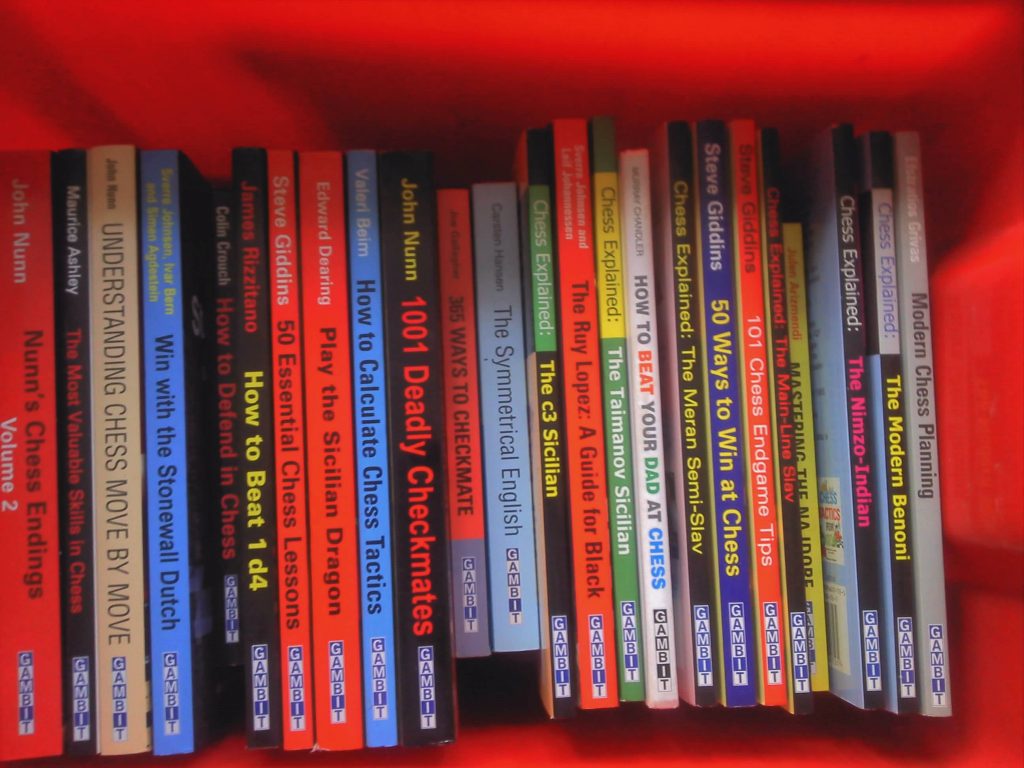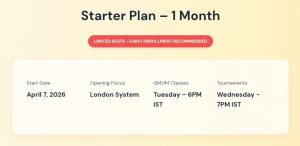Why is a Chess Books Library Required?
A chess library isn’t just a collection of books; it’s a reservoir of wisdom and experience. Chess is a game of strategy, tactics, and creativity. It’s about understanding your opponent’s moves and planning several steps ahead. A chess book library equips players with the tools they need to excel. It contains the insights and knowledge of grandmasters and experts, providing a unique perspective that online resources alone can’t offer. It’s a place to delve deep into chess history, strategy, and psychology.
Looking for expert guidance? Caissa School of Chess has become a top choice for chess players starting their chess learning journey. Explore their offerings before deciding on your chess coach.
What Does a Chess Book Library Include?
A comprehensive chess books library encompasses a wide range of books and resources. Here are some essential categories along with book recommendations:
Strategy Books: These delve into the nuances of chess strategy, helping players understand positional play, pawn structures, and piece activity.
– Book Recommendation: “My Great Predecessors” series by Garry Kasparov
Motivation and Biographies: Reading about the journeys of chess legends like Bobby Fischer, Garry Kasparov, and Magnus Carlsen can be incredibly motivating. Biographies provide insights into their struggles and triumphs.
– Book Recommendation: “Bobby Fischer Teaches Chess” by Bobby Fischer
Success Stories: Books on famous chess matches and tournaments help players analyze top-level games, learning from the masters.
– Book Recommendation: “Logical Chess: Move by Move” by Irving Chernev
Case Studies: These books offer practical scenarios, allowing players to apply strategies and tactics in real games.
– Book Recommendation: “1001 Winning Chess Sacrifices and Combinations” by Fred Reinfeld
Guides and Assistance Tools: Chess libraries should also include guides on openings, endgames, and tactics. They’re valuable references during practice and play.
– Book Recommendation: “Modern Chess Openings” by Nick de Firmian
How Does it Help Chess Players and Parents?
For chess players, a library serves as a constant source of learning and improvement. It offers diverse perspectives, allowing them to develop their unique playing style. Players can learn from past masters’ victories and mistakes, refining their strategies and tactics. Moreover, reading about the journeys of great players can boost motivation and perseverance.
Chess parents benefit by having access to valuable resources to support their child’s chess education. They can recommend relevant books, helping their child enhance their skills and knowledge. Further, a chess book library fosters a learning environment within the family, creating a deeper bond between parents and their young chess enthusiasts.
Kickstart your chess journey with professional coaching. Check out the Caissa School of Chess for resources and training tailored to every skill level.
Where Do You Start?
Building a chess book library may seem daunting, but it’s a step-by-step process. Begin with foundational books that cover chess basics, such as rules, piece movements, and simple tactics. As you progress, invest in strategy books to develop a deeper understanding of the game. Biographies and success stories can provide inspiration and motivation.
Consider your specific needs and interests. If you’re passionate about openings, explore books dedicated to this aspect. If you want to excel in endgames, focus on that area. Don’t forget to include assistance tools like chess notation books and digital resources.
Must-Have Chess Books for Aspiring Players
For Beginners
These books are perfect for those new to chess or looking to solidify their foundational knowledge.
- “Bobby Fischer Teaches Chess” by Bobby Fischer
- A classic chess book that uses a unique programmed learning approach.
- Focuses on teaching basic checkmate patterns and tactical thinking.
- Ideal for absolute beginners.
- “Chess for Dummies” by James Eade
- A comprehensive guide covering rules, strategies, and basic tactics.
- Includes tips on how to read notation and improve your game.
- Great for casual players and newcomers.
- “The Complete Idiot’s Guide to Chess” by Patrick Wolff
- Explains chess fundamentals in an easy-to-understand manner.
- Covers openings, middlegame strategies, and endgames.
- Perfect for beginners who want a structured learning path.
For Intermediate Players
These chess books are designed for players who understand the basics and want to improve their tactical and strategic skills.
- “My System” by Aron Nimzowitsch
- A timeless classic that introduces key concepts like prophylaxis, overprotection, and pawn structures.
- Focuses on positional play and strategic thinking.
- A must-read for players looking to deepen their understanding of chess strategy.
- “Silman’s Complete Endgame Course” by Jeremy Silman
- A comprehensive guide to endgames, tailored to different skill levels.
- Explains endgame concepts in a clear and practical way.
- Helps players master essential endgame techniques.
- “The Amateur’s Mind” by Jeremy Silman
- Focuses on improving decision-making and understanding imbalances in chess.
- Uses real-life examples from amateur games to illustrate key concepts.
- Great for players looking to transition from beginner to intermediate level.
For Advanced Players
These chess books are tailored for advanced players and aspiring grandmasters who want to refine their skills and study high-level strategies.
- “Pawn Structure Chess” by Andrew Soltis
- A deep dive into pawn structures and their impact on the game.
- Explains how to exploit weak pawn structures and create strong ones.
- A valuable resource for advanced players looking to master positional play.
- “Dvoretsky’s Endgame Manual” by Mark Dvoretsky
- Considered the bible of endgame study.
- Covers complex endgame scenarios and techniques.
- Recommended for serious players aiming to master endgames.
- “Think Like a Grandmaster” by Alexander Kotov
- Focuses on improving calculation and decision-making skills.
- Introduces the concept of “candidate moves” and how to analyze them effectively.
- A classic book for advanced players seeking to think like a pro.
For Tactics and Puzzles
Improving tactical awareness is crucial for players of all levels. These books are packed with puzzles and exercises to sharpen your skills.
- “Chess Tactics for Champions” by Susan Polgar
- A collection of tactical puzzles designed to improve your calculation and pattern recognition.
- Suitable for players of all levels.
- Great for daily practice and improving tactical vision.
- “1001 Chess Exercises for Beginners” by Franco Masetti and Roberto Messa
- A beginner-friendly book with 1001 tactical puzzles.
- Focuses on basic patterns like forks, pins, and skewers.
- Perfect for building a strong tactical foundation.
- “Winning Chess Tactics” by Yasser Seirawan
- Explains common tactical motifs with clear examples.
- Includes exercises to test your understanding.
- Ideal for intermediate players looking to improve their tactical skills.
For Openings and Middlegame Strategies
Understanding openings and middlegame plans is essential for competitive play. These books provide in-depth analysis and practical advice.
- “Modern Chess Openings” by Nick de Firmian
- A comprehensive guide to modern opening theory.
- Covers a wide range of openings and their key ideas.
- A must-have reference book for serious players.
- “The Complete Manual of Positional Chess” by Sakaev and Landa
- Focuses on understanding and mastering positional play.
- Explains how to evaluate positions and make strategic decisions.
- Suitable for intermediate and advanced players.
- “My Great Predecessors” by Garry Kasparov
- A series of books that analyze the games of chess legends.
- Provides insights into the strategies and thought processes of the greatest players in history.
- Inspiring and educational for advanced players.
For Mental Toughness and Psychology
Chess is as much a mental game as it is a strategic one. These books focus on the psychological aspects of chess.
- “Pump Up Your Rating” by Axel Smith
- Focuses on practical advice for improving your rating.
- Covers topics like time management, preparation, and mental toughness.
- Great for players looking to break through plateaus.
- “The Inner Game of Chess” by Andrew Soltis
- Explores the psychological side of chess, including decision-making and handling pressure.
- Offers tips on how to stay focused and confident during games.
- A valuable read for competitive players.
Conclusion
In the realm of chess, knowledge is power. A chess library is more than just a collection of books; it’s an arsenal of strategies, tactics, and inspiration. Whether you’re a dedicated player or a supportive chess parent, a well-curated chess library is a powerful asset on your journey towards chess excellence. It offers a wealth of insights, motivation, and learning opportunities that can’t be replicated elsewhere. So, start building your chess library today, and let the game of kings elevate your skills and passion to new heights.
Enhance your chess journey with structured learning. Visit the Caissa School of Chess to discover coaching programs and learning materials to complement your library.





